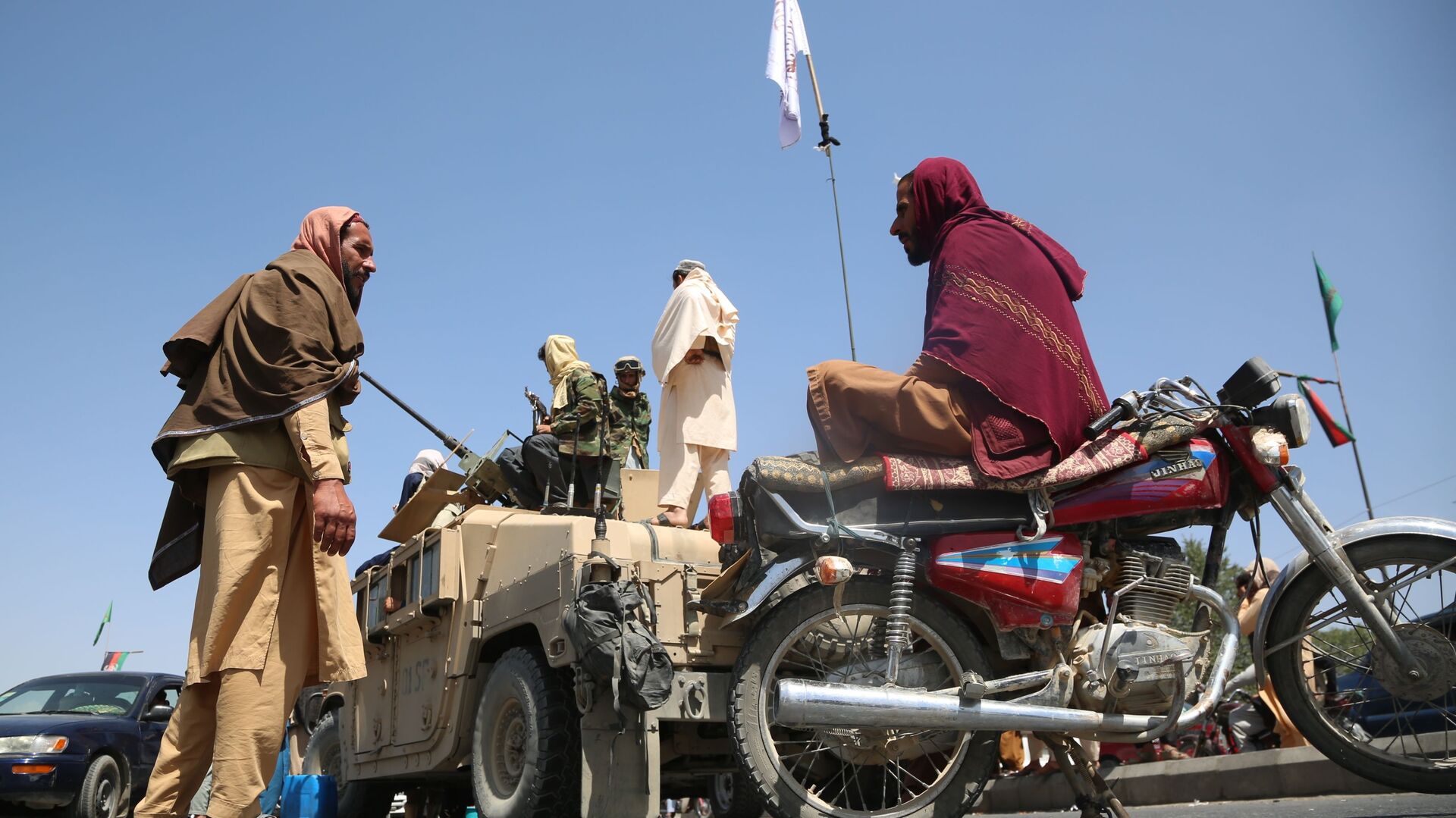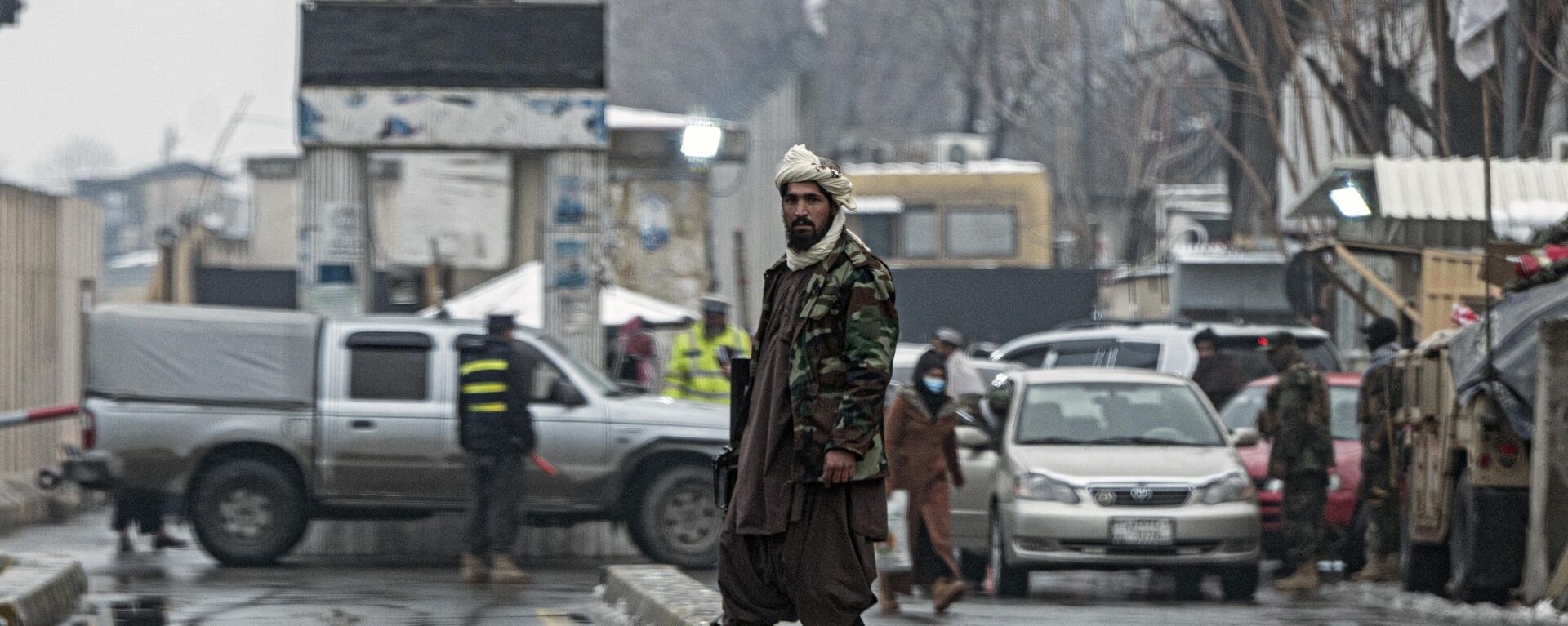https://sputniknews.in/20230222/after-us-withdrawal-from-afghanistan-the-terrorist-threat-was-activated-there-972820.html
Terrorist Threat on Rise in Afghanistan After US Withdrawal: FSB
Terrorist Threat on Rise in Afghanistan After US Withdrawal: FSB
Sputnik India
Western countries, with the help of their special services, recruit people for terrorist cells in Afghanistan. A representative of the Russian special services said
2023-02-22T15:26+0530
2023-02-22T15:26+0530
2023-02-22T17:40+0530
arms control
sputnik opinion
counter-terrorism
terrorism
central asia
afghanistan
taliban
daesh (isis/is/islamic state)
al-qaeda
federal security service (fsb)
https://cdn1.img.sputniknews.in/img/07e7/02/16/972804_0:134:3165:1914_1920x0_80_0_0_5b9ed159795699485d963763c7c8816d.jpg
The heyday of the Daesh-Khorasan, or Daesh-K, terrorist activities coincided with the withdrawal of the US military contingent from Afghanistan, an employee of Russia's Federal Security Service (FSB) told Sputnik on Wednesday.Who Sponsors Terrorism in Central Asia?Against the background of the military defeat in Syria and Iraq, Daesh is transferring its forces to other regions, in particular to Afghanistan, the FSB employee told Sputnik.The United States is interested in fueling conflict zones, including in Central Asia, that is why Washington is actively using terrorists to accomplish its geopolitical goals in the region, he noted.Daesh's presence in Afghanistan was first registered in 2015, and the group claimed their aim was to take control of the whole region. Back then, al-Qaeda** operatives formed the backbone of Daesh's wing in Afghanistan, which was given the name of "Daesh-Khorasan."During 2022 alone, the group committed about 20 high-profile terrorist attacks in Afghanistan, Pakistan, and Iran, in which more than 500 people were killed."Among the most prominent was the terrorist attack on September 5, 2022, when a suicide bomber blew himself up near the Russian Embassy in Kabul, killing two diplomats of the Russian Federation," he recalled.Given the aforementioned, it is likely that terrorist attacks and raids in the region could become more frequent.After the withdrawal of US troops, the security of all of Central Asia risks being compromised by new challenges. But it's not all bad: the Collective Security Treaty Organization (CSTO) is entering the region abandoned by the United States and will conduct cross-border exercises with Central Asian countries such as Kyrgyzstan, Tajikistan, Uzbekistan, as well as Turkmenistan, which is also worried about the security of its country.What is Daesh-Khorasan?On January 26, 2015, the official spokesperson for Daesh at the time, Abu Muhammad al-Adnani, published an audio recording of a statement in which he took a solemn oath of allegiance and announced the expansion of the so-called "caliphate" with the creation of the Khorasan Vilayat (Khorasan province), the historical territory of modern-day Afghanistan and Pakistan.Daesh began actively accepting defectors from the Taliban*** into its ranks, especially those militants who were angered by their leaders or were impatient with the lack of success on the battlefield. This prompted Taliban leader Attar Mansour to write a letter addressed to Daesh leader Abu Bakr al-Baghdadi, asking him to stop recruiting in Afghanistan, arguing that the war in Afghanistan should be under the leadership of the Taliban.Despite the fact that the group has managed to gain a foothold in Afghanistan, it largely carries out attacks on a smaller scale in Pakistan.* Daesh (also known as IS/ISIS) is a terrorist organization banned in Russia** al-Qaeda is a terrorist organization banned in Russia and many countries around the world*** The Taliban is under UN sanctions for terrorism
https://sputniknews.in/20230112/russian-mfa-calls-on-afghanistan-to-take-action-to-eradicate-terrorist-threat-483214.html
central asia
afghanistan
uzbekistan
russia
Sputnik India
feedback.hindi@sputniknews.com
+74956456601
MIA „Rossiya Segodnya“
2023
News
en_IN
Sputnik India
feedback.hindi@sputniknews.com
+74956456601
MIA „Rossiya Segodnya“
Sputnik India
feedback.hindi@sputniknews.com
+74956456601
MIA „Rossiya Segodnya“
afghanistan, islamic state, daesh, terrorist threat, special services, central asia
afghanistan, islamic state, daesh, terrorist threat, special services, central asia
Terrorist Threat on Rise in Afghanistan After US Withdrawal: FSB
15:26 22.02.2023 (Updated: 17:40 22.02.2023) It is no secret that terrorist groups in Central Asia have their own cells in many countries, and one such cell is Daesh*-Khorasan.
The heyday of the Daesh-Khorasan, or Daesh-K, terrorist activities coincided with the withdrawal of the US military contingent from Afghanistan, an employee of Russia's Federal Security Service (FSB) told Sputnik on Wednesday.
"Having lost the war on the ground, Washington switched to covert operations, and the withdrawal of US forces surprisingly coincided with the activation of the activities of this terrorist structure," the employee told Sputnik.
Who Sponsors Terrorism in Central Asia?
Against the background of the military defeat in Syria and Iraq, Daesh is transferring its forces to other regions, in particular to Afghanistan, the FSB employee told Sputnik.
The United States is interested in
fueling conflict zones, including in Central Asia, that is why Washington is actively using terrorists to accomplish its geopolitical goals in the region, he noted.
Daesh's presence in Afghanistan was first registered in 2015, and the group claimed their aim was to take control of the whole region. Back then, al-Qaeda** operatives formed the backbone of Daesh's wing in Afghanistan, which was given the name of "Daesh-Khorasan."
"The replenishment of the ranks of Daesh-K was carried out most actively in 2017 and 2018 under the control of the special services of the West, who gained experience in interacting with the Islamic State in Syria and Iraq by transferring jihadists with combat experience," the Russian intelligence service employee said.
During 2022 alone, the group committed about 20 high-profile terrorist attacks in Afghanistan, Pakistan, and Iran, in which more than 500 people were killed.
"Among the most prominent was the terrorist attack on September 5, 2022, when a suicide bomber blew himself up near the Russian Embassy in Kabul, killing two diplomats of the Russian Federation," he recalled.
Given the aforementioned, it is likely that terrorist attacks and raids in the region could become more frequent.
After the withdrawal of US troops, the security of all of Central Asia risks being compromised by new challenges.
But it's not all bad: the Collective Security Treaty Organization (CSTO) is entering the region abandoned by the United States and will conduct cross-border exercises with Central Asian countries such as Kyrgyzstan, Tajikistan, Uzbekistan, as well as Turkmenistan, which is also worried about the security of its country.
On January 26, 2015, the official spokesperson for Daesh at the time, Abu Muhammad al-Adnani, published an audio recording of a statement in which he took a solemn oath of allegiance and announced the expansion of the so-called "caliphate" with the creation of the Khorasan Vilayat (Khorasan province), the historical territory of modern-day Afghanistan and Pakistan.
Daesh began actively accepting defectors from the Taliban*** into its ranks, especially those militants who were angered by their leaders or were impatient with the lack of success on the battlefield.
This prompted Taliban leader Attar Mansour to write a letter addressed to Daesh leader Abu Bakr al-Baghdadi, asking him to stop recruiting in Afghanistan, arguing that the war in Afghanistan should be under the leadership of the Taliban.
According to a UN report, up to 70 Daesh fighters arrived from Iraq and Syria to form the core of the group in Afghanistan. Along with foreign fighters from Pakistan and Uzbekistan, most of the group's membership came from recruiting defectors from the Taliban. The militants of the Khorasan Vilayat maintain contact with the central leadership of Daesh in Syria, although the exact relationship is unclear.
Despite the fact that the group has managed to gain a foothold in Afghanistan, it largely carries out attacks on a smaller scale
in Pakistan.
* Daesh (also known as IS/ISIS) is a terrorist organization banned in Russia
** al-Qaeda is a terrorist organization banned in Russia and many countries around the world
*** The Taliban is under UN sanctions for terrorism


